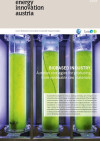Suchergebnisse für "Factsheet: Energietechnologien gestalten, die für alle sinnvoll und nutzbar sind"
Pioneer Region for Smart Grids in Upper Austria
Worldwide a change of energy systems takes place. The increased use of renewable energy leads to a decentralization of energy supply and therefore active control systems for the energy supply systems will be necessary.
Research and Innovation for Heating and Cooling with Renewable Energy Sources

position paper related to biomass, geothermal energy, solar thermal energy and heat pumps in order to support persons responsible for Austrian energy research programs to define main research and innovation topics for renewable heating and cooling within these programs
Schriftenreihe
28/2014
Englisch
Technology and Innovation Roadmap "BioHeating and Cooling"

The Roadmap links with the energy research strategy of the Austrian Council for Research. It was developped together with national stakeholders from industry to deduct recommendations for policy makers. It includes clear suggestions for research topics until 2020 and provides an outlook on the contribution of biomass to the heating sector of a decarbonised energy system in 2050.
Using buildings as energy storage - Monitoring project: Detached house H and detached house F Energy source wind power – Energy source solar power
Monitoring and comparison of performance of thermally activated building components in two similarly built, inhabited detached houses with different energy sources (wind and solar power). The functionality of energy supply through wind power or solar energy will be investigated as well as the verification of the practicability of self-regulating system control due to building temperature behaviour. The results provide an insight into the calculation assumptions, system control and feasibility of the smart grid technology.
Einfach:wohnen, Phase Construction

Support for the erection of the demonstrative housing project consisting of 7 houses (5 Low energy houses, 1 passive house and 1 "next to passive house")
"IÖB-Tool" Housing and renewable energy technologies
Innovation-promoting public procurement tool for housing and renewable energy technologies
Business model innovations for rental and service models in the manufacturing sector
The project aims to contribute to a better understanding of the economic and ecological potentials of an implementation of lending and service models in the manufacturing sector in Austria and to show which changes and R&D efforts are necessary so that these can be realized by suitable business models.
IEA Bioenergy Task 42: Biorefinery (Working Period 2007 - 2009)
Austrian Participation on IEA Bioenergy Task 42: "Biorefineries - Co-production of Fuels, Chemicals, Power, and Materials from Biomass", Triennium 2007 to 2009
RAILWASTE - Production of railway sleepers by mixed plastic waste (SUSPRISE Joint Call)
Production of railway crossties ("sleepers") from an alternative (renewable) raw material
Smart Gas Grids - Intelligent Gas Networks of the Future
The basic principles of "Smart Gas Grids" will be investigated and practical issues and deployment strategies will be studied in detail. Furthermore, together with the relevant stakeholders, a "Vision- and Strategy Paper" and a draft for a "Strategic Research Agenda" will be developed.
S I P settlement models in passive house quality
Research, development and realization of integral building concepts in passive house quality!
Webinar: The past, present and future for biomass gasification
30. January 2020
Webinar - online, AT
The IEA Bioenergy Webinar Series are dedicated to various topics in the field of bioenergy. This time the past, current situation and outlook into the future of thermal gasification are discussed.
Feed-in and system integration of biogas in existing gas grids
Method for assessment of technological aspects of biogas supply to existing gas grids. Definition of characteristic numbers for quantitative an qualitative analysis. Aspects of systems integration.
IEA Cities Task 4: Climate Neutral Districts (Working period 2026 - 2029)
The Task 4 develops and adapts methods and frameworks for the practical planning, implementation and evaluation of climate-neutral neighbourhoods. Interoperable data platforms, governance structures, stakeholder engagement and analytical approaches are systematically considered to create a robust, scalable methodology that enables cities to measure their progress and achieve climate-neutral goals while maintaining social and economic balance.
1000 passive houses in Austria - 3rd documentation period 2006 - 2008
3rd documentation period of the joint project of IG Passivhaus Österreich to set up a detailed network documentation on a representative cross-section of all passive houses in Austria.
Biobased Industry

Austrian strategies for producing from renewable raw materials
energy innovation austria
3/2015
Herausgeber: BMVIT and Klima- und Energiefonds
Englisch, 8 Seiten
Downloads zur Publikation
Sustainable product service for raising the energy efficiency of injection moulding machines for plastics
Performing a feasibility study of establishing a sustainable product service for raising the energy efficiency of injection moulding machines for plastics via analysing the basic organizational and technical conditions.
IEA SHC Task 62: Solar Energy in Industrial Water and Wastewater Management
The main objective of IEA SHC Task 62 was to increase the use of solar thermal energy in industry, to develop new collector technologies and to open up industrial and municipal water treatment as a new area of application with high market potential for solar thermal energy. The focus was on thermal separation technologies as well as technologies for solar water decontamination and disinfection. By combining the technologies with solar collectors, an innovative and economically attractive overall solution should be created for integration into industry.
Evaluation of the planning and building processes of multi-storey wooden construction residential and office buildings, and the development of measures to optimise these processes.

An analysis of the building and planning processes of multi-storey wooden construction residential and office buildings, taking into consideration the opinions of the professionals involved (planners, building contractors, building executives), then the development, documentation and distribution of ways to optimise these processes, using "Info-Tool" software.
